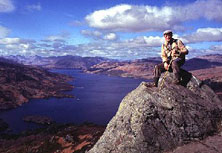
The world is their bathroom
Discarded human waste has become a mounting problem in Scotland’s national parks since new land access laws, combined with last summer’s glorious weather, encouraged a minority of dumb assholes to spoil it all for the rest of us who want to camp overnight in beauty spots.
Now the authorities are planning a trial of “human poop-scoops” involving supplying plastic trowels and bags to the thoughtless minority of campers so they can either bury the waste before they go home or take it with them for later disposal.
Scenic areas affected by those who answer the call of nature without cleaning up after them include the banks around popular beaches on lochs Lomond, Earn, Venachar and Voil.
The plan will be put to the park’s board this week and officials will be instructed to develop it over the winter. A trial is likely to take place in the park early next year in an attempt to cut down on the antisocial behaviour.
Dr Mike Cantlay, a Callander-based businessman and the park’s new convener, said he no longer took his young daughters to some of the area’s best-known beauty spots because of the mess left behind.
“Of course we want more people to come to the park and access to land is encouraged,” Cantlay said. “But because of the Land Reform Act we are seeing people who never came here before camping out with no appreciation of what that involves.
“The vast majority come and stay and leave without causing any impact, but there are some who leave their mess behind.
“Human excrement has now become a major issue, and apart from the possibility of disease we don’t want our wardens and rangers to have to spend their time cleaning it up. But we don’t want to stop people coming here, so we are looking at possible solutions such as providing an implement for them to bury their waste or take it away with them.”
One local resident who supports the plan is school cleaner Audrey Corrieri, who travelled to a car park on the banks of Loch Venacharfor a picnic last July with her husband Paul.
Corrieri said: “The first thing we noticed was all the tents and fires. The second thing we noticed was the mess, litter and broken glass everywhere.
“We followed the path down to the water’s edge to let the dog have a swim. On the path were several piles of human faeces with used kitchen roll alongside, no attempt to dispose of it.
“It was absolutely disgusting and our visit lasted the whole of 10 minutes before we headed hastily to the car.”
The Land Reform Act, passed by the Scottish Parliament in 2003, allows so-called “wild camping” – outside official sites – as long as access rights are exercised responsibly.
Officials at Scotland’s first national park believe the reforms have rightly encouraged more people to camp overnight in the park’s beauty spots, but many have remained ignorant of codes of behaviour in the countryside.
John McQueen, the park’s warden service manager, said: “This problem has suddenly got worse in areas such as Duck Bay and Luss on Loch Lomond, and at Lochearnhead. People have to answer the call of nature but they don’t want to be involved in having to get rid of the result.
“But when you leave your house people should be aware that they have a responsibility for the wider environment.
“You wouldn’t expect to go down Argyle Street or Buchanan Street in Glasgow and be confronted by lots of little parcels, but people seem to think this is acceptable in the countryside.
“We are not talking about remote parts of the park but busy areas close to communities like Luss or on the West Highland Way. One of my guys left some stones overnight while he was repairing a drain. When he returned someone had come along, dumped in the middle of the path and just placed a stone on top.
“Plastic trowels could be a very good initiative. When people go to camping shops or to buy a portable barbecue, there is no reason why they couldn’t pick up a plastic trowel and a disposal bag at the same time,” McQueen added.
Officials are now planning to develop a plastic trowel giveaway scheme over the next few months with a trial next spring. Shops used by fishermen and other visitors will be asked to stock the trowels and plastic bags to be picked up by customers when buying other products.
Bob Elliott, the national park’s senior operations manager, said: “We have seen an increase in this problem, particularly in certain hotspots near beaches where there is easy access.
“But how do you stop people doing this without spoiling their overall enjoyment? We think the plastic trowels could be a way of doing this even if it’s just a symbolic measure that helps promote the correct behaviour.”
The Mountaineering Council for Scotland introduced its own Where To Go In The Great Outdoors guide six years ago to deal with similar problems.
It advises walkers and campers to take a trowel to bury waste, except on thin-soiled mountainsides, or, preferably, to bag it up and take it away.
MCS development officer Kevin Howett said: “The problem with burying it is that you might dig up rare plant life or dig a hole where someone else has just dug a hole, which, of course, is not very pleasant. It is better if you bag your waste and take it away with you.” But we think that is going too far.